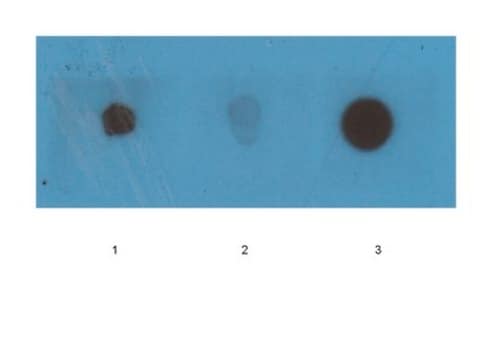MABN2620
Anti-Myelin Proteolipid Protein Antibody
Sinónimos:
Anti-GPM6C, Anti-HLD1, Anti-MMPL, Anti-PLP, Anti-PLP/DM20, Anti-PMD, Anti-SPG2
About This Item
Productos recomendados
biological source
rat
Quality Level
conjugate
unconjugated
antibody form
purified antibody
antibody product type
primary antibodies
clone
AA3, monoclonal
mol wt
calculated mol wt 30.02 kDa
observed mol wt ~17 kDa
species reactivity
human, mouse, rat
species reactivity (predicted by homology)
bovine
packaging
antibody small pack of 100 μg
technique(s)
immunocytochemistry: suitable
immunohistochemistry (formalin-fixed, paraffin-embedded sections): suitable
immunoprecipitation (IP): suitable
western blot: suitable
isotype
IgG2bκ
UniProt accession no.
shipped in
dry ice
storage temp.
2-8°C
target post-translational modification
unmodified
Gene Information
bovine ... PLP1(281410)
General description
Specificity
Immunogen
Application
Evaluated by Western Blotting in SH-SY5Y cell lysate.
Western Blotting Analysis: A 1:1,000 dilution of this antibody detected Myelin Proteolipid Protein in SH-SY5Y cell lysate.
Tested Applications
Western Blotting Analysis: A 1:1,000 dilution from a representative lot detected Myelin Proteolipid Protein in HepG2 cell lysate.
Immunohistochemistry (Paraffin) Analysis: A 1:50 dilution from a representative lot detected Myelin Proteolipid Protein in human cerebral cortex and human cerebellum tissue sections.
Immunoprecipitation Analysis: A representative lot immunoprecipitated Myelin Proteolipid Protein in Immunoprecipitation applications (Gudz, T.I., et. al. (2006). J Neurosci. 26(9):2458-66).
ELISA Analysis: A representative lot detected Myelin Proteolipid Protein in ELISA applications (Yamamura, T., et. al. (1991). J Neurochem. 57(5):1671-80).
Immunohistochemistry Applications: A representative lot detected Myelin Proteolipid Protein in Immunohistochemistry applications ( Gudz, T.I., et. al. (2006). J Neurosci. 26(9):2458-66; Sarret, C., et. al. (2010). Neuroscience. 166(2):522-38).
Western Blotting Analysis: A representative lot detected Myelin Proteolipid Protein in Western Blotting applications (Zhu, H., et. al. (2012). Glia. 60(1):69-82).
Immunocytochemistry Analysis: A representative lot detected Myelin Proteolipid Protein in Immunocytochemistry applications (Sarret, C., et. al. (2010). Neuroscience. 166(2):522-38).
Note: Actual optimal working dilutions must be determined by end user as specimens, and experimental conditions may vary with the end user
Physical form
Storage and Stability
Other Notes
Disclaimer
¿No encuentra el producto adecuado?
Pruebe nuestro Herramienta de selección de productos.
Storage Class
12 - Non Combustible Liquids
wgk_germany
WGK 1
flash_point_f
Not applicable
flash_point_c
Not applicable
Certificados de análisis (COA)
Busque Certificados de análisis (COA) introduciendo el número de lote del producto. Los números de lote se encuentran en la etiqueta del producto después de las palabras «Lot» o «Batch»
¿Ya tiene este producto?
Encuentre la documentación para los productos que ha comprado recientemente en la Biblioteca de documentos.
Nuestro equipo de científicos tiene experiencia en todas las áreas de investigación: Ciencias de la vida, Ciencia de los materiales, Síntesis química, Cromatografía, Analítica y muchas otras.
Póngase en contacto con el Servicio técnico







